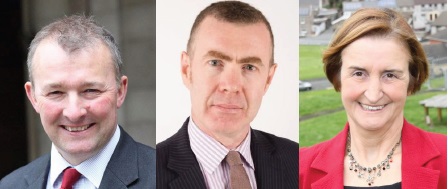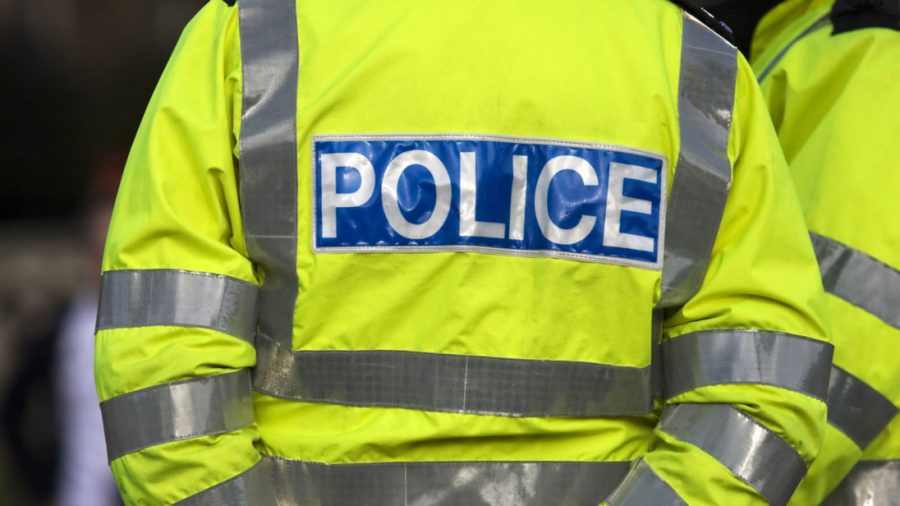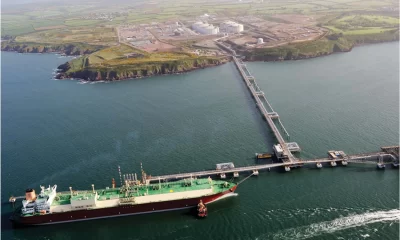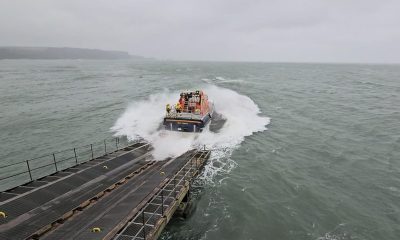News
What next for West Wales?


Simon Hart: Striking a balance is important Adam Price: Wales ‘faces biggest economic challenge since the 30s’ Nia Griffith: Labour must promote stability
AFTER WALES joined England in voting to leave the European Union on Thursday (Jun 23) , subsequent talk has focused on what the future has to offer for the country.
While Ceredigion voted to remain in the EU, both Carmarthenshire and Pembrokeshire voted Leave by a higher proportion than the national average.
In Carmarthenshire, it has been suggested that a Leave majority in Llanelli, as well as a 55-45% majority vote for Brexit in Carmarthen West and South Pembrokeshire , were the main reasons why the county as a whole voted out. It is thought that Carmarthen East and Dinefwr voted Remain, although post -polling sampling results had not been confirmed at the time of going to press.
Of the five MPs and nine AMs representing Carmarthenshire, Ceredigion, and Pembrokeshire, only one – UKIP’s Neil Hamilton – was in favour of leaving the EU.
The result swiftly led to David Cameron’s resignation, and calls for Jeremy Corbyn to resign – following a referendum he didn’t particularly want – swiftly grew within the party, leading to mass shadow cabinet resignations after Hilary Benn was sacked for reportedly trying to engineer a coup.
Among those to resign was Llanelli MP and former Shadow Secretary of State for Wales , Nia Griffith, who said in her resignation letter that, while she recognised Mr Corbyn’s huge mandate from voters and the ‘fresh thinking’ he had brought to the Labour Party, she lacked confidence that he was capable of uniting the party in readiness for a possible snap election.
Speaking after the referendum results were announced, Ms Griffith said : “Labour must do everything we can as the official opposition in Westminster to promote stability in the markets, and to push for Britain to have the best possible terms for an exit from the EU.
“Our immediate priority for Wales is to ensure that the way Wales receives funding from the UK Government is reformed and that funding is increased to make up for the money that we currently receive from the EU .
“We must seek workable agreements with the EU that give our manufacturing companies the confidence to remain in the UK, and that is of particular importance to us here in Llanelli, so that we can safeguard jobs.”
Plaid Cymru leader , Leanne Wood , has talked about the prospect of a referendum for Welsh independence following the result. However, this is far less likely to be realised than it would be in Scotland.
Not only has support for Welsh independence always been significantly lower than it is on the far side of Hadrian’s Wall – less than 10% – but more crucially, Wales also voted in favour of leaving the EU. Holding, never mind winning, a referendum in these circumstances would be close to impossible.
Local Plaid Cymru MP Jonathan Edwards spoke of a ‘radical reconfiguration of powers ‘ .
“We cannot allow the UK to continue to be dominated by Westminster,” he added, criticising the Leave campaign for having ‘absolutely no plan for the future of the UK or our economy ‘ .
“Plaid Cymru’s role will always be stand up for the best interests of Wales and her people.
“We will do all we can to protect our communities and defend the Welsh national interest.”
Simon Hart MP, who had also supported remaining in the EU, said that an important issue would be striking a balance between the large numbers of people who voted for each side. “75% of people in the younger age bracket voted Remain and it’s important that what we do represents their fears and aspirations as much as it does the Leave group,” he added. He also emphasised that it would be in the interests of local businesses for the uncertainties regarding the country’s future to be dealt with as soon as possible.
Adam Price made no bones about the scale of the task ahead for Wales and the UK . The Plaid Cymru AM said: “Without doubt , Wales now faces perhaps the biggest economic challenge it has seen since the 1930s.
“There is an almighty challenge ahead. It would be wrong of anyone to try to undermine the seriousness of the problems our economy now faces.
“I stand ready to play my part in helping protect the people of Wales.
“I am delighted that Carmarthen East and Dinefwr communities did record a Remain vote. Had the Labour party not lost the support of its core voters across the county , then we would have certainly seen Carmarthenshire as a whole vote to Remain a member of the EU.”
Eluned Morgan AM, who had been actively campaigning for Remain across Mid and West Wales, said she was ‘hugely disappointed’ with the result.
“But we live in a democracy and that is what the people have decided,” she remarked. “During our campaigning , we heard loud and clear that people are very worried about the difficulties struggling communities face.
“Our message that this was not about Europe but about working even harder to ensure we continue to invest in our communities to drive up investment, to create jobs, simply did not get across.
“This was made particularly hard for us having just come out of a gruelling Assembly election campaign. It will now be harder to make the economic investment we need , but what that means in practice is that we’ll need to work even harder, including taking into account the clear geographic as well as class division rifts that this referendum has shown us.
“We need to connect. We need to listen – t hat’s what I’ll be continuing to do in Mid and West Wales. This result will have devastating economic political and constitutional effects on our communities for generations to come .”
Curiously, her concerns were not shared by Neil Hamilton AM or the Leader of the Welsh Conservatives , Andrew RT Davies. Mr Hamilton described June 23 as ‘a historic day for Wales and democracy.’
“A decisive majority of Welsh people rejected the outrageous campaign of scaremongering and brow-beating by the political and big business elites,” the UKIP Senedd leader added. “David Cameron presided over this and, having failed, he had to resign. George Osborne should now follow him without delay.”
Andrew RT Davies, while not campaigning particularly actively for Vote Leave, had publicly stated his support before the Assembly elections.
Speaking after the referendum result was announced , he said: “I am immensely proud to be part of a party which delivered this referendum to the people of the UK, giving them an enormous opportunity to determine the course of their future.
“The will of the people has today been declared, and the result marks an historic moment of positive change for our country.
“Wales has sent a clear message that it wants to be part of that change, and politicians of all stripes must now come together to deliver on this momentous constitutional decision.
“The campaign was not without its strong disagreements, and it is important that we reflect on those who voted and campaigned to Remain.
“What unites both sides of the campaign is our belief in in the democratic process and our love for our country.”
The question many people are asking is quite a simple one: What happens next? At some point, it is looking likely that Britain’s Prime Minister will sign the Article 50 agreement , which will trigger a two year exit timescale. What is looking even more likely is that the hand on the pen will not be that of David Cameron.
Mr Cameron, who only pledged the referendum in a (disastrously unsuccessful) attempt to unify Tory Eurosceptics and as a sop to potential UKIP voters ahead of the 2015 election, has no intention of going down in history as the PM who signed his country out of Europe.
The Conservative Party at every level is sharply divided on the issue, and while a majority of Conservative MPs backed Remain, the results of this referendum appear to mean that a Vote Leave supporter is likely to take the reins, especially as a majority of Conservative voters backed Brexit.
It remains to be seen whether there is any lasting impact on the financial security of the UK, though the plummet in the value of sterling on Friday morning has only partially recovered. Foreign holidays will be more expensive, and it is thought that grocery costs could rise as well.
There has been a sharp increase in the number of reported incidents of racially motivated attacks following the referendum, something the Leave campaign’s focus on immigration has been blamed for. However, there is no way of verifying this. Given that immigration was only ever partially the result of Britain’s EU membership, certain aspects of the campaign, including Nigel Farage’s infamous ‘Breaking Point’ billboards, were vilified for being misleading and for aggravating existing tensions.
If anything has been made clear by this referendum, it is an increasing unwillingness on the part of the British public to trust the word of politicians, combined with a feeling of dissociation from the political process.
Social media was full of comments from those who suspected the use of pencils in a ballot box was part of a Remain conspiracy – which possibly shows a certain lack of familiarity with voting procedure. However, the size of the turnout suggests that a number of people who do not regularly exercise their say in choosing their Member of Parliament, never mind AM, made the effort to vote on a subject that became increasingly emotive.
It will be interesting to see whether the Leave campaign will be capable of honouring their loosely worded pledges regarding immigration, NHS funding, and increased democracy should their leader Boris Johnson’s sidekick Michael Gove, become Prime Minister.
One thing is certain: While only 52% of voters voted Leave, closer to 100% will be looking to make sure that these promises are kept.
News
Vote.wales: Information website launched to give people voting confidence

Vote.wales to host all essential election information for the Senedd election
A BRAND new voter information website, vote.wales, has been launched today (2 March) by the Electoral Management Board for Wales, part of the Democracy and Boundary Commission Cymru.
Vote.wales is the first website of its kind in Wales and tells people everything they need to know about the election, including advice about voting, information about the Senedd, and a postcode search function to provide tailored local information.
The website holds information about who can register to vote, how voting works in polling stations, as well as postal and proxy voting, and what accessibility support people can expect when they go to vote.
A postcode search function on vote.wales allows voters to see which of Wales’ 16 new constituencies they will be voting in, as well as telling them where their local polling station is located.
Once nominations have closed, the website will also inform voters which political parties and independent candidates are standing in their area.
The website explains how the Senedd works and what it does, highlighting which policy areas are devolved to the Senedd and which remain the responsibility of the UK Parliament. It also sets out the difference between the Senedd and the Welsh Government.
Further developments are expected in the coming weeks. In a first for Welsh elections, voters will soon be able to access detailed accessibility information about their local polling station. Political parties and independent candidates will also be able to publish their election leaflets on the platform, so voters can see not only who is standing but what they stand for.
Following the election, vote.wales will publish the full election results.
Commenting on the launch, Shereen Williams MBE OStJ, Chief Executive of the Democracy and Boundary Commission Cymru, said:
“An important election is coming on 7 May, and vote.wales is the place to go to find out all about it.
“We know that people across Wales are looking forward to making their voices heard at this election, but many people don’t feel they have all the information they need before they go and vote.
“If you have questions about this election, then head to vote.wales. Voting confidence starts here.”
Crime
Pencoed: Assault victim dies and murder investigation launched

THE POLICE investigation into the serious incident which happened on Felindre Road, Pencoed, in the early hours of Saturday, February 28, is now being treated as murder.
We can confirm the 58-year-old man who was critical in hospital passed away earlier today – his family are being supported by specially trained officers at this time, and our thoughts are with them.
The Major Crime Investigation Team at South Wales Police is now leading the investigation, and the 26-year-old man arrested remains in police custody.
Detectives investigating the incident are appealing to anyone who may have been in the vicinity of Felindre Road, Pencoed, between midnight and 5am on Saturday to get in touch.
Motorists are urged to their check dashcams for any footage which may be relevant.
Detectives would like to speak to two potential witnesses – two elderly people who are believed to have walked along Felindre Road between 12.30am and 4am on Saturday.
Detective Inspector Graham Williams, from the Major Crime Investigation Team, said: “Sadly, a 58-year-old man has died in hospital following the incident on Saturday morning. Our thoughts are with his family at this time and they are being supported. I would like to reassure the local community that we have somebody in custody and are not looking for anybody else at this time. I thank everyone in the community who has helped our investigation so far, and I urge anyone with information which may be relevant to our investigation – particularly the two potential witnesses – to get in touch.”
If anybody does have information, they should contact 101 quoting reference 2600063517. Alternatively, they can submit information via the Major Incident Public – https://mipp.police.uk/operation/62SWP26C30-PO1
Crime
School lockdown lifted after telephone threat as police continue enquiries

PUPILS and staff at Maesydderwen Comprehensive School in Ystradgynlais were released safely on Monday afternoon (Mar 2) after a lockdown was implemented following a reported telephone threat.
Dyfed-Powys Police confirmed officers were called to the school earlier in the day and worked with staff to ensure the safety of everyone on site. As a precaution, the school activated its lockdown procedure while enquiries were carried out.
Police said there were no reports of injuries and that all pupils and staff were safe and secure throughout the incident.
Officers remain at the scene while “diligent enquiries” into the threat continue. At this stage, no arrests have been made, and police have confirmed there is no evidence of any ongoing risk to pupils or staff.
Reassurance patrols will take place in the coming days to support pupils, staff, parents and the wider community.
Parents and guardians will continue to receive updates directly through the school messaging app, including confirmation on whether the school will open as normal on Tuesday.
Maesydderwen Comprehensive School is located in Ystradgynlais, Powys, and is served by Dyfed-Powys Police.
-

 News6 days ago
News6 days agoLabour and Plaid criticised over £1.2m anti-racism ‘metaverse’ project
-

 Health6 days ago
Health6 days agoHealth services row escalates as MSs demand action over Withybush and Bronglais
-

 Politics6 days ago
Politics6 days agoFarage vows to strip Cardiff’s ‘City of Sanctuary’ status ahead of manifesto launch
-

 News6 days ago
News6 days agoPlaid Cymru drug decriminalisation policy under spotlight ahead of Senedd election
-

 Business5 days ago
Business5 days agoCouncil reviewing complaints over Computer Solutions Wales as concerns continue
-

 Health5 days ago
Health5 days agoPetition calling for Withybush intervention nears 5,000 signatures
-

 News5 days ago
News5 days agoWelsh Government criticised after Russian-linked drone image used in defence announcement
-

 Crime6 days ago
Crime6 days agoManchester men deny aggravated burglary after armed raid on dog breeder


























